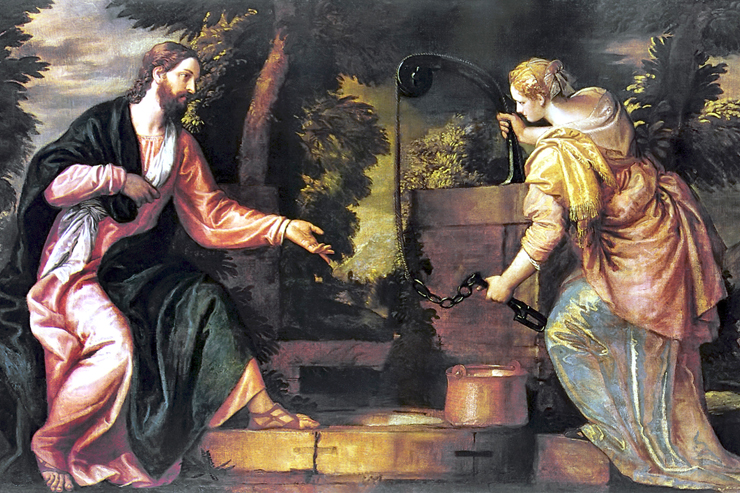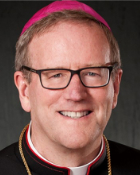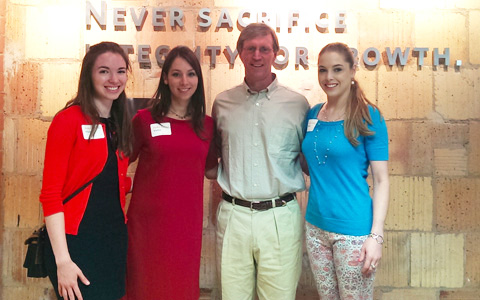
“Christ and the Woman of Samaria” (detail) by Paolo Veronese
While I was in central Georgia, filming the Flannery O’Connor episode of my Pivotal Players series, I saw a sign on the outside of a church, which would have delighted the famously prickly Catholic author: “All Sinners Are Welcome!” I thought it was a wonderfully Christian spin on the etiquette of welcome that is so pervasive in our culture today. In a time of almost complete ethical relativism, the one value that everyone seems to accept is inclusivity, and the only disvalue that everyone seems to abhor is exclusivity. “Who am I to tell you what to do?” and, of course, everyone gets inside the circle. What I especially liked about the sign in Georgia was that it compels us to make some distinctions and think a bit more precisely about this contemporary moral consensus.
Is it true to say “everyone is welcome”? Well, yes, if we mean welcome into the circle of the human family, welcome as a subject of infinite dignity and deserving love and respect. Christians—and indeed all decent people—stand against the view, pervasive enough in the supposed culture of inclusion, that the unborn, the aged, the unproductive are not particularly welcome. If by “all are welcome,” one means that all forms of racism, sexism, and elitism are morally repugnant, then yes, the slogan is quite correct.
But let’s consider some other scenarios. Would we claim that everyone is welcome to become a member of the college baseball team? Everyone is welcome to try out, I suppose, but the coach will assess each candidate and will then make a judgment that some are worthy of being on the team and others aren’t. Like it or not, he will include some and exclude others. Would we claim that everyone is welcome to play in a symphony orchestra? Again, in principle, anyone is invited to give it a go, but the conductor will make a fairly ruthless determination as to who has what it takes to make music at the highest level and who doesn’t, and he will include and exclude accordingly. Would we argue that everyone is welcome to be a free member of our civil society? Well, yes, if we consider the matter in abstraction; but we also acknowledge that certain forms of behavior are incompatible with full participation in the public space. And if misbehavior is sufficiently egregious, we set severe limits to the culprit, restricting his movement, bringing him to trial, perhaps even imprisoning him.
With this basic distinction in mind, let us consider membership in the Church of Jesus Christ. Are all people welcome to the Church? Yes of course! Everyone and his brother cites James Joyce to the effect that the Catholic Church’s motto is “here comes everybody,” and this is fundamentally right. Jesus means to bring everyone to union with the Triune God, or to state the same thing, to become a member of his Mystical Body the Church. In John’s Gospel, Jesus declares, “When the Son of Man is lifted up, he will draw all people to himself.” Bernini’s colonnade, reaching out like great in-gathering arms from St. Peter’s Basilica, is meant to symbolize this universally inclusive welcome offered by Christ. Is the Church, as Pope Francis says, a field hospital where even the most gravely wounded are invited for treatment? Is the Lord’s mercy available to everyone, even to the most hardened of sinners? Yes! And does the Church even go out from itself to care for those who are not explicitly joined to Christ? Yes! In fact, this was one of the reasons the Church was so attractive in the ancient world: when Roman society left the sick to fend for themselves and often cast away the newly-born who were deemed unworthy, the Church included these victims of the “throwaway culture” of that time and place.
However, does this mean that the Church makes no judgments, no discriminations, no demands? Does the Church’s welcome imply that everyone is fine just as he or she is? Here we have to answer with a rather resounding no. And that Georgia sign helps us to understand why. The Greek word that we translate as “church” is “ekklesia,” which carries the sense of “called out from.” Members of the Church have been called out of a certain way of life and into another one, out of conformity with the world and into conformity with Christ. Every ecclesiastical person, therefore, is a welcomed sinner who has been summoned to conversion. She is someone who is, by definition, not satisfied with who she is. To return to the Pope’s famous image, a field hospital receives not those who are doing just great but those who are deeply, even gravely, wounded. The problem is that anytime the Church sets a limit or makes a demand or summons to conversion, she is accused of being “exclusive” or insufficiently “welcoming.” But this cannot be right. As Cardinal George once put it, commenting upon the famous liturgical song “All Are Welcome,” all are indeed welcome, but on Christ’s terms, not their own.
Editor’s Note: Bishop Barron’s article first appeared July 24, 2018 on the Word on Fire website and is presented here with the kind permission of the author.
















